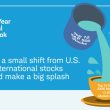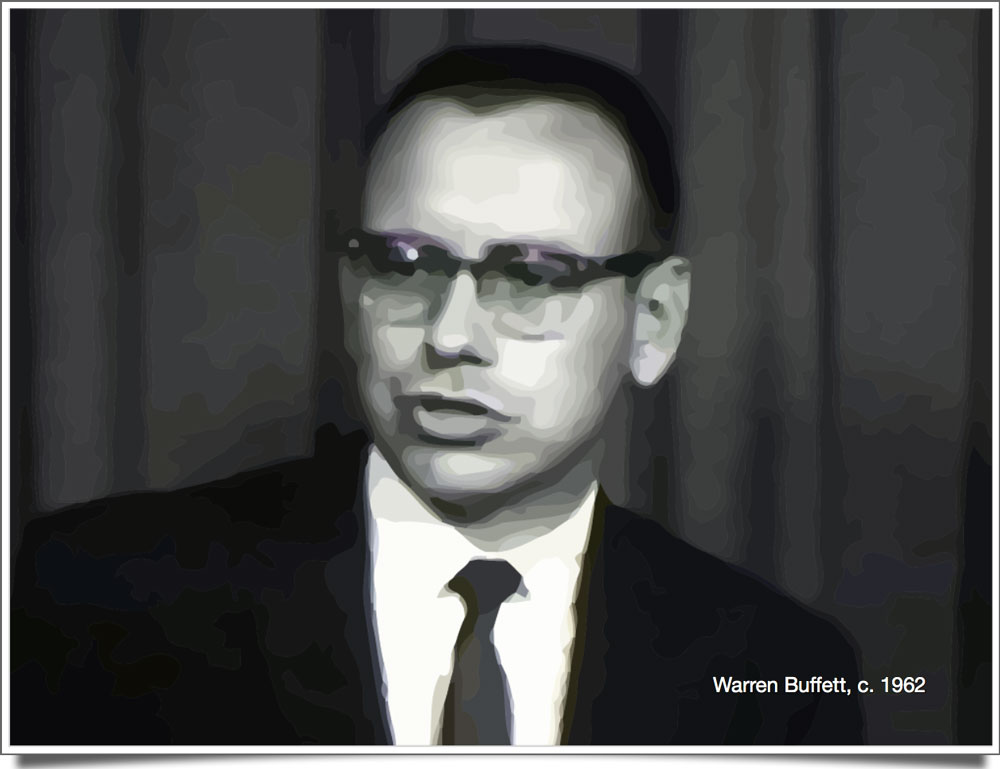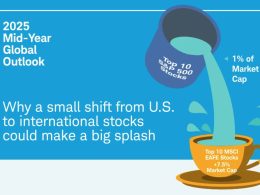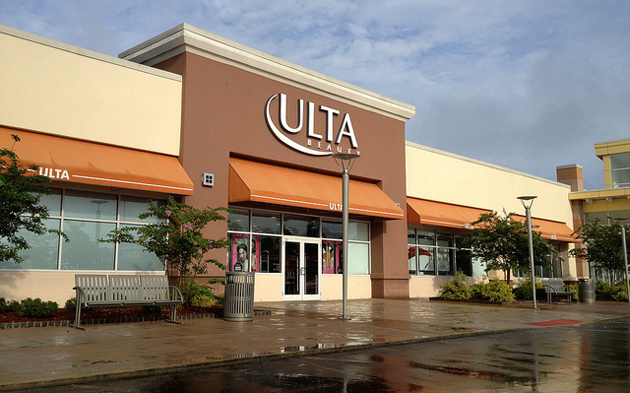OK, so I know this thing about not timing the market leads to a lot of debate. One thing you always hear when talking about this is that Warren Buffett himself is a market-timer. Well, yes, he has made comments on the market over the years; in 1999/2000 warning of a high market cap to GDP ratio, and again in 2008 telling people it's "time to buy America". He also shut down his partnership in the late 1960's, just in time to avoid a nasty bear market.
So yes, Buffett does seem like a market timer. But first of all, other than this closing of the partnership and accumulating of stocks in the 1970's, I don't think he has actually benefited too much from his own market insights; he has responded to opportunities for sure, but he didn't make much money getting in and out of markets according to market valuation levels.
Anyway, upon closer examination of his shutting down of the partnership, the market's overall valuation was just one part of the reason why he shut down. He didn't tell people necessarily to get out of the stock market, buy puts, gold or anything like that at all. He did say that bonds offered the same expected returns as stocks at the time (in 1969).
In any case, let's take a look at Buffett's comments about the market in the partnership years, and finally his last letter to partners and what his outlook was for stocks as of 1969. This may surprise some people.
Buffett started the partnership in 1956. At the time, both Buffett's father and Benjamin Graham advised him not to get into the stock market as it is overvalued having reached a new post 1929-crash high. The late 1950's was around the time that dividend yields went below bond yields for the first time since at least 1871. Stocks were thought of as risky so dividend yields were always higher than bond yields, and when this flipped over, many thought that stocks were overvalued and that stock dividend yields will inevitably get back above bond yields again. Never mind that they were right; it finally did so in the late 2000's (time for those folks that got out of stocks in 1957 to get back in!).
P/E ratios (and even the Shiller P/E) were on the high end so stocks were clearly not cheap.
Here is what Buffett said about the market in 1957 (emphasis mine):
The General Stock Market Picture in 1957
In last year's letter to partners, I said the following:
"My view of the general market level is that it is priced above intrinsic value. This view relates to blue-chip securities. This view, if accurate, carries with it the possibility of a substantial decline in all stock prices, both undervalued and otherwise. In any event I think the probability is very slight that current market levels will be thought of as cheap five years from now. Even a full-scale bear market, however, should not hurt the market value of our work-outs substantially.
"If the general market were to return to an undervalued status our capital might be employed exclusively in general issues and perhaps some borrowed money would be used in this operation at that time. Conversely, if the market should go considerably higher our policy will be to reduce our general issues as profits present themselves and increase the work-out portfolio.
"All of the above is not intended to imply that market analysis is foremost in my mind. Primary attention is given at all times to the detection of substantially undervalued securities."
Our Activities in 1957
The market decline has created greater opportunity among undervalued situations so that, generally, our portfolio is heavier in undervalued situation relative to work-outs than it was last year. Perhaps an explanation of the term "work-out" is in order. A work-out is an investment which is dependent on a specific corporate action for its profit rather than a general advance in the price of the stock as in the case of undervalued situations. Work-outs come about through sales, mergers, liquidations, tenders, etc. In each case, the risk is that something will upset the applecart and cause the abandonment of the planned action, not that the economic picture will deteriorate and stocks decline generally. At the end of 1956, we had a ratio of about70-30 between general issues and work-outs. Now it is about 85-15.
So we see that when the market is pricey, Buffett moves more into "work-outs" (what we would call today "special situations"). But you will see that even in 1956, his ratio of general issues to work-outs was 70-30. He is not running to cash, gold, buying puts or anything like that.
Here is his comment in 1958:
THE GENERAL STOCK MARKET IN 1958
A friend who runs a medium-sized investment trust recently wrote: "The mercurial temperament characteristic of the American people, produced a major transformation in 1958 and 'exuberant' would be the proper word for the stock market, at least".
I think this summarizes the change in psychology dominating the stock market in 1958 at both the amateur and professional levels. During the past year; almost any reason has been seized upon to justify "Investing" in the market. There are undoubtedly more mercurially-tempered people in the stock market now than for a good many years and the duration of their stay will be limited to how long they think profits can be made quickly and effortlessly. While it is impossible to determine how long they will continue to add numbers to their ranks and thereby stimulate rising prices, I believe it is valid to say that the longer their visit, the greater the reaction from it.
I make no attempt to forecast the general market - my efforts are devoted to finding undervalued securities. However, I do believe that widespread public belief in the inevitability of profits from investment in stocks will lead to eventual trouble. Should this occur, prices, but not intrinsic values in my opinion, of even undervalued securities can be expected to be substantially affected.
In 1958, the market was not particularly cheap either, and Buffett sounds very cautious. But again, he continues to do his thing. He is not running to cash, gold, or getting short the market or anything like that.
Moving on:
From 1959 Letter
Most of you know I have been very apprehensive about general stock market levels for several years. To date, this caution has been unnecessary. By previous standards, the present level of "blue chip" security prices contains a substantial speculative component with a corresponding risk of loss. perhaps other standards of valuation are evolving which will permanently replace the old standards. I don't think so. I may very well be wrong; however, I would rather sustain the penalties resulting from-over-conservatism than face the consequences of error, perhaps with permanent capital loss, resulting from the adoption of a "New Era" philosophy where trees really do grow to the sky.
And yet the partnership was fully invested:
The Present Portfolio:
Last year I mentioned a new commitment which involved about 25% of the assets of the various partnerships. Presently, this investment is about 35% of assets. This is an unusually large percentage, but has been made for strong reasons. In effect, this company is partially an investment trust owning some thirty or forty other securities of high quality. Our investment was made and is carried at a substantial discount from asset value based on market value of their securities and a conservative appraisal of the operating business.
We are the Company's largest stockholder by a considerable margin, and the two other large holders agree with our ideas. The probability is extremely high that the performance of this investment will be superior to that of the general market until its disposition, and I am hopeful that this will take place this year.
The remaining 65% of the portfolio is in securities which I consider undervalued and work-out operations. To the extent possible, I continue to attempt to invest in situations at least partially insulated from the behavior of the general market.
Now this was back in 1959. I can imagine some current managers, if they were in 1959, might be hiding in cash, fully hedging their portfolios, buying puts or getting into commodities or something like that. But not Buffett.
From Ground Rules in the 1962 (dated January 1963) letter:
6. I am not in the business of predicting general stock market or business fluctuations. If you think I can do this, or think it is essential to an investment program, you should not be in the partnership.
And still from the 1962 letter (emphasis mine):
The Usual Prediction
I am certainly not going to predict what general business or the stock market are going to do in the next year or two, since I don't have the faintest idea.
I think you can be quite sure that over the next ten years, there are going to be a few years when the general market is plus 20% or 25%, a few when it is minus on the same order, and a majority when it is in between. I haven't any notion as to the sequence in which these will occur, nor do I think it is of any great importance for the long-term investor. If you will take the first table on page 3 and shuffle the years around, the compounded result will stay the same. If the next four years are going to involve, say, a +40%, -30%, +10% and -6%, the order in which they fall is completely unimportant for our purposes as long as we all are around at the end of the four years. Over a long period of years, I think it likely that the Dow will probably produce something like 5% per year compounded from a combination of dividends and market value gain. Despite the experience of the last decade, anyone expecting substantially better than that from the general market probably faces disappointment.
And keep in mind that the market looked really expensive in 1962. He didn't run to cash, buy puts, or fully hedge his portfolio or anything of the sort.
Warming to the idea of control businesses from the 1967 letter (emphasis mine):
The satisfying nature of our activity in controlled companies is a minor reason for the moderated investment objectives discussed in the October 9th letter. When I am dealing with people I like, in businesses I find stimulating (what business isn't?), and achieving worthwhile overall returns on capital employed (say, 10 - 12%), it seems foolish to rush from situation to situation to earn a few more percentage points. It also does not seem sensible to me to trade known pleasant personal relationships with high grade people, at a decent rate of return, for possible irritation, aggravation or worse at potentially higher returns. Hence, we will continue to keep a portion of our capital (but not over 40% because of the possible liquidity requirements arising from the nature of our partnership agreement) invested in controlled operating businesses at an expected rate of return below that inherent in an aggressive stock market operation.
This sort of hints at the evolution of Buffett's investment style (from a more active manager to a longer term value investor that owns parts of businesses and not pieces of paper).
Lowering the Bar
Throughout the late 1960's, he does complain about the increasing speculation in the markets and decreasing opportunities available. He even lowers the hurdle for his returns as he wants to back off a little bit from active management. He used to target 10% outperformance versus the Dow, but revised it to a 9% return or 5% outperformance of the Dow, whichever is lower. This was due to the following reasons (from the October 1967 letter to partners):
1. The market environment has changed progressively over the past decade, resulting in a sharp diminution in the number of obvious quantitatively based investment bargains available;
2. Mushrooming interest in investment performance (which has its ironical aspects since I was among a lonely few preaching the importance of this some years ago) has created a hyper-reactive pattern of market behavior against which my analytical techniques have limited value;
3. The enlargement of our capital base to about $65 million when applied against a diminishing trickle of good investment ideas has continued to present the problems mentioned in the January, 1967 letter; and
4. My own personal interests dictate a less compulsive approach to superior investment results than when I was younger and leaner.
He says point 4. is most important and elaborates later in the letter:
The final, and most important, consideration concerns personal motivation. When I started the partnership I set the motor that regulated the treadmill at "ten points better than the Dow". I was younger, poorer and probably more competitive. Even without the three previously discussed external factors making for poorer performance, I would still feel that changed personal conditions make it advisable to reduce the speed of the treadmill. I have observed many cases of habit patterns in all activities of life, particularly business, continuing (and becoming accentuated as years pass) long after they ceased making sense. Bertrand Russell has related the story of two Lithuanian girls who lived at his manor subsequent to World War I. Regularly each evening after the house was dark, they would sneak out and steal vegetables from the neighbors for hoarding in their rooms; this despite the fact that food was bountiful at the Russell table. Lord Russell explained to the girls that while such behavior may have made a great deal of sense in Lithuania during the war, it was somewhat out of place in the English countryside. He received assenting nods and continued stealing. He finally contented himself with the observation that their behavior, strange as it might seem to the neighbors, was really not so different from that of the elder Rockefeller.
Elementary self-analysis tells me that I will not be capable of less than all-out effort to achieve a publicly proclaimed goal to people who have entrusted their capital to me. All-out effort makes progressively less sense. I would like to have an economic goal which allows for considerable non-economic activity. This may mean activity outside the field of investments or it simply may mean pursuing lines within the investment field that do not promise the greatest economic reward. An example of the latter might be the continued investment in a satisfactory (but far from spectacular) controlled business where I liked the people and the nature of the business even though alternative investments offered an expected higher rate of return. More money would be made buying businesses at attractive prices, then reselling them. However, it may be more enjoyable (particularly when the personal value of incremental capital is less) to continue to own them and hopefully improve their performance, usually in a minor way, through some decisions involving financial strategy.
Retiring in 1969 (emphasis mine)
And finally, in 1969 he writes to his partners that he is retiring:
The October 9th, 1967 letter stated that personal considerations were the most important factor among those causing me to modify our objectives. I expressed a desire to be relieved of the (self-imposed) necessity of focusing 100% on BPL. I have flunked this test completely during the last eighteen months. The letter said: "I hope limited objectives will make for more limited effort." It hasn't worked out that way. As long as I am "on stage", publishing a regular record and assuming responsibility for management of what amounts to virtually 100% of the net worth of many partners, I will never be able to put sustained effort into any non-BPL activity. If I am going to participate publicly, I can't help being competitive. I know I don't want to be totally occupied with out-pacing an investment rabbit all my life. The only way to slow down is to stop.
In the 1969 letter, he said he will hold and distribute control positions, Diversified Retailing and Berkshire Hathaway:
3. However, I also want all partners to have the option of maintaining their proportional interests in our two controlled companies (Diversified Retailing Company, Inc. and Berkshire Hathaway, Inc.) and one other small "restricted" holding. Because these securities will be valued unilaterally by me at fair value, I feel it is essential that, if you wish, you can maintain your proportionate interest at such valuation.
However, these securities are not freely marketable (various SEC restrictions apply to "control" stock and non-registered stock) and they will probably be both non-transferable and non-income-producing for a considerable period of time. Therefore, I want you to be able to go either way in our liquidation - either stick with the restricted securities or take cash equivalent. I strongly like all of the people running our controlled businesses (joined now by the Illinois National Bank and Trust Company of Rockford, Illinois, a $100 million plus, extremely well-run bank, purchased by Berkshire Hathaway earlier this year), and want the relationship to be life-long. I certainly have no desire to sell a good controlled business run by people I like and admire, merely to obtain a fancy price. However, specific conditions may cause the sale of one operating unit at some point.
Despite the bubbly market conditions, he decides to hold onto his controlled equity positions. This is not someone running for the hills getting out so he can buy back in cheaper; he is just shutting down his partnership.
Total failure?
As an aside, I thought this paragraph was kind of funny to read decades later:
Some of you are going to ask, "What do you plan to do?" I don't have an answer to that question. I do know that when I am 60, I should be attempting to achieve different personal goals than those which had priority at age 20. Therefore, unless I now divorce myself from the activity that has consumed virtually all of my time and energies during the first eighteen years of my adult life, I am unlikely to develop activities that will be appropriate to new circumstances in subsequent years.
Well, actually he did say that one of the potential future activities could be investing and participating in a "satisfactory controlled" business. And that's Berkshire Hathaway, so I guess he succeeded on that front.
From the October 1969 letter, recommending Bill Ruane:
Now, to Bill Ruane - we met in Ben Graham's class at Columbia University in 1951 and I have had considerable opportunity to observe his qualities of character, temperament and intellect since that time. If Susie and I were to die while our children are minors, he is one of three trustees who have carte blanche on investment matters - the other two are not available for continuous investment management for all partners, large or small.
There is no way to eliminate the possibility of error when judging humans - particularly in regard to future behavior in an unknown environment. However, decisions have to be made - whether actively or passively - and I consider Bill to be an exceptionally high probability decision on character and a high probability one on investment performance. I also consider it likely that Bill will continue as a money manager for many years to come.
Bill's overall record has been very good - averaging fairly close to BPL's, but with considerably greater variation. From 1956 - 1961 and from 1964 - 1968, a composite 'of his individual accounts averaged over 40% per annum.
Expectations as of October 1969
Finally, a word about expectations. A decade or so ago I was quite willing to set a target of ten percentage points per annum better than the Dow, with the expectation that the Dow would average about 7% This meant an expectancy for us of around 17% - with wide variations and no guarantees, of course - but, nevertheless, an expectancy. Tax-free bonds at the time yielded about 3%. While stocks had the disadvantage of irregular performance, overall they seemed much the more desirable option. I also stressed this preference for stocks in teaching classes, participating in panel discussions, etc.For the first time in my investment lifetime, I now believe there is little choice for the average investor between professionally managed money in stocks and passive investment in bonds. If correct, this view has important implications. Let me briefly (and in somewhat over-simplified form) set out the situation as I see it:(1) I am talking about the situation for, say, a taxpayer in a 40% Federal Income Tax bracket who also has some State Income Tax to pay. Various changes are being proposed in the tax laws, which may adversely affect net results from presently tax-exempt income, capital gains, and perhaps other types of investment income. More proposals will probably come in the future. Overall, I feel such changes over the years will not negate my relative expectations about after-tax income from presently tax-free bonds versus common stocks, and may well even mildly reinforce them.(2) I am talking about expectations over the next ten years - not the next weeks or months. I find it much easier to think about what should develop over a relatively long period of time than what is likely in any short period. As Ben Graham said: "In the long run, the market is a weighing machine - in the short run, a voting machine. " I have always found it easier to evaluate weights dictated by fundamentals than votes dictated by psychology.(3) Purely passive investment in tax-free bonds will now bring about 6-1/2%. This yield can be achieved with excellent quality and locked up for just about any period for which the investor wishes to contract. Such conditions may not exist in March when Bill and I will be available to assist you in bond purchases, but they exist today.(4) The ten year expectation for corporate stocks as a group is probably not better than 9% overall, say 3% dividends and 6% gain in value. I would doubt that Gross National Product grows more than 6% per annum - I don't believe corporate profits are likely to grow significantly as a percentage of GNP - and if earnings multipliers don't change (and with these assumptions and present interest rates they shouldn't) the aggregate valuation of American corporate enterprise should not grow at a long-term compounded rate above 6% per annum. This typical experience in stocks might produce (for the taxpayer described earlier) 1-3/4% after tax from dividends and 4-3/4% after tax from capital gain; for a total after-tax return of about 6-1/2%. The pre-tax mix between dividends and capital gains might be more like 4% and 5%, giving a slightly lower after-tax result. This is not far from historical experience and, overall, I believe future tax rules on capital gains are likely to be stiffer than in the past.(5) Finally, probably half the money invested in stocks over the next decade will be professionally managed. Thus, by definition virtually, the total investor experience with professionally managed money will be average results (or 6-1/2% after tax if my assumptions above are correct).My judgment would be that less than 10% of professionally managed money (which might imply an average of $40 billion just for this superior segment) handled consistently for the decade would average 2 points per annum over group expectancy. So-called "aggressively run" money is unlikely to do significantly better than the general run of professionally managed money. There is probably $50 billion in various gradations of this "aggressive" category now - maybe 100 times that of a decade ago - and $50 billion just can't "perform".If you are extremely fortunate and select advisors who achieve results in the top 1% to 2% of the country (but who will be working with material sums of money because they are that good), I think it is unlikely you will do much more than 4 points per annum better than the group expectancy. I think the odds are good that Bill Ruane is in this select category. My estimate, therefore, is that over the next decade the results of really excellent management for our "typical taxpayer" after tax might be 1-3/4% from dividends and 7-3/4% from capital gain, or 9-1/2% overall.(6) The rather startling conclusion is that under today's historically unusual conditions, passive investment in tax-free bonds is likely to be fully the equivalent of expectations from professionally managed money in stocks, and only modestly inferior to extremely well-managed equity money.(7) A word about inflation - it has very little to do with the above calculation except that it enters into the 6% assumed growth rate in GNP and contributes to the causes producing 6-1/2% on tax-free bonds. If stocks should produce 8% after tax and bonds 4%, stocks are better to own than bonds, regardless of whether prices go up, down or sideways. The converse is true if bonds produce 6-1/2% after tax, and stocks 6%. The simple truth, of course, is that the best expectable after-tax rate of return makes the most sense - given a rising, declining or stable dollar.
All of the above should be viewed with all the suspicion properly accorded to assessments of the future. It does seem to me to be the most realistic evaluation of what is always an uncertain future - I present it with no great feeling regarding its approximate accuracy, but only so you will know what I think at this time.
You will have to make your own decision as between bonds and stocks and, if the latter, who advises you on such stocks. In many cases, I think the decision should largely reflect your tangible and intangible (temperamental) needs for regularity of income and absence of large principal fluctuation, perhaps balanced against psychic needs for some excitement and the fun associated with contemplating and perhaps enjoying really juicy results. If you would like to talk over the problem with me, I will be very happy to help.
So this is very interesting. Even at the go-go frothy time of 1969, Buffett saw after-tax expected returns in stocks of 6.5%/year. Nowhere does he suggest that investors should avoid stocks and invest in something else, like real estate or farmland. He suggests that you can get the same returns as the stock market in high quality tax-free bonds but that seems to be a function of rising interest rates and taxes at the time. So on a relative basis, he feels bonds look attractive (boy, is he in for a big surprise in the 1970's!).
This 6.5%/year after tax return expectation compares to the 5%/year (don't know if that was after-tax) he expected back in 1962, so his tax-free bond comment is more a function of rising interest rates and taxes than anything about the stock market.
He also didn't tell people to stay in cash and wait for a correction and for stocks to get cheaper before getting into equities. He suggested that your decision might be based on your temperament, need for regular income, psychic needs etc.
I'm not sure what number (7) about inflation means but using his math, higher inflation would actually tip the balance in favor of stocks (as inflation hurts the fixed coupon bonds while it will push up nominal GNP growth rate and therefore corporate values (as nominal profits rise)).
Conclusion
So yes, Buffett did retire in 1969 due to the lack of investment opportunity (more on this opportunity in a moment) so in that sense it does sort of smell like market timing; he got out at the top.
But does his retirement really mean that he lost faith in stocks as good long term investments at the then prices? His expectations suggest not. He does say that for the first time in a long time, tax-free bonds offer the same forward expected return as stocks, so stocks were certainly on a relative basis not as attractive as they used to be.
On the other hand, he does continue to own the control positions and doesn't exit stocks entirely. He also recommends an equity manager for the partners.
And if you take a closer look at why he retired, it was for various reasons. The manic stock market and lack of opportunity is a big factor, of course. But the growing size of the partnership and his own personal needs to do something else were factors too.
Let's think about this for a second. The partnership's mandate for most of the time was to better the index by 10% per year. The revised, lowered goal was to earn a 9%/year absolute or 5% better than the index, whichever is lower.
So his retirement was not necessarily a judgement that stocks will no longer be good investments going forward. It was that with his AUM and level of personal commitment, it would be difficult to earn 9%/year or 5% better than the market and Buffett didn't want to maintain the sort of intensity that would be needed to keep doing that.
Retiring because he thought it would be hard to beat the market by 10%/year (as he used to do), or by 5%/year (after lowering the goal) over time is a very different decision than saying that stocks no longer make sense as long term investments.
In a later post, I'll take a look at Buffett the market timer in the Berkshire years.
Copyright © The Brooklyn Investor















